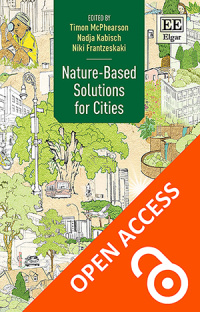
Hardback
Handbook of Regional Cooperation and Integration
This is an open access title available under the terms of a CC BY-NC-ND 4.0 License. It is free to read, download and share on Elgaronline.com.
This timely Handbook offers a detailed cross-policy assessment on the need, locale and impact of regional cooperation and integration, addressing how the principles of regional integration have affected multi-level governance and subsequent public policy. Individual chapters provide explanations of what regional cooperation means in a specific policy area, identify relevant theories, and present empirical evidence to support the arguments outlined.
This timely Handbook offers a detailed cross-policy assessment on the need, locale and impact of regional cooperation and integration, addressing how the principles of regional integration have affected multi-level governance and subsequent public policy. Individual chapters provide explanations of what regional cooperation means in a specific policy area, identify relevant theories, and present empirical evidence to support the arguments outlined.
More Information
Critical Acclaim
Contributors
More Information
This timely Handbook offers a detailed cross-policy assessment on the need, locale and impact of regional cooperation and integration, addressing how the principles of regional integration have affected multi-level governance and subsequent public policy. Individual chapters provide explanations of what regional cooperation means in a specific policy area, identify relevant theories, and present empirical evidence to support the arguments outlined.
The Handbook of Regional Cooperation and Integration brings together a diverse range of expert contributors who deftly explore regional cooperation across a number of key policy areas, including migration, trade, the digital sphere, finance, security, democracy and higher education. Through a comprehensive analysis of the nature of and need for regional cooperation in today’s world, this Handbook argues for greater and more pressing discussions on regional policy, the value of integration and its resulting application in organisations.
A crucial text for global governance, international relations and public policy academics and students, this is also an invigorating read for regional studies scholars. The Handbook ’s in-depth study of practical applications makes this suitable for public officials in the sector, as well as regional organisation and think tank staff.
The Handbook of Regional Cooperation and Integration brings together a diverse range of expert contributors who deftly explore regional cooperation across a number of key policy areas, including migration, trade, the digital sphere, finance, security, democracy and higher education. Through a comprehensive analysis of the nature of and need for regional cooperation in today’s world, this Handbook argues for greater and more pressing discussions on regional policy, the value of integration and its resulting application in organisations.
A crucial text for global governance, international relations and public policy academics and students, this is also an invigorating read for regional studies scholars. The Handbook ’s in-depth study of practical applications makes this suitable for public officials in the sector, as well as regional organisation and think tank staff.
Critical Acclaim
‘This extraordinary book presents and analyzes the multi-dimensional universe of regional cooperation and integration. Across seventeen policy areas, it explores the potential of innovative regional frameworks with solid economics and beyond. This is a product of UNU-CRIS’s extensive research networks and Dr. De Lombaerde's superb leadership.’
– Fukunari Kimura, Keio University, Japan and Chief Economist, Economic Research Institute for ASEAN and East Asia (ERIA), Indonesia
‘This book is very timely because the challenges of climate change, peace and security and sustainable development we face require regional collaboration and solidarity to successfully tackle. The collaboration between regions in the global South and global North is also crucial for resolving these issues.’
– Tshilidzi Marwala, United Nations Under-Secretary-General and Rector of United Nations University
– Fukunari Kimura, Keio University, Japan and Chief Economist, Economic Research Institute for ASEAN and East Asia (ERIA), Indonesia
‘This book is very timely because the challenges of climate change, peace and security and sustainable development we face require regional collaboration and solidarity to successfully tackle. The collaboration between regions in the global South and global North is also crucial for resolving these issues.’
– Tshilidzi Marwala, United Nations Under-Secretary-General and Rector of United Nations University
Contributors
Contributors include: Tuba Agartan, Obijiofor Aginam, Deborah Casalin, Martha Cassidy-Neumiller, Meng-Hsuan Chou, Sarah Cook, Philippe De Lombaerde, Alix Debray, Fatima Denton, Amandine Gnanguênon, Stephanie Hofmann, Sophie Hoogenboom, Jeroen Huisman, M. Rafiqul Islam, Anja Jetschke, Alexandra Kaasch, Janet M. Kiguru, William N. Kring, Yaechan Lee,Dries Lesage, Ine Lietaert, Wouter Lips, Maria Pilar Lorenzo, Frank Mattheis, Justine Miller, Carlota Morais, Eli James Moskowitz, Sören Münch, Elijah Nyaga Munyi, Nidhi Nagabhatla, Nahuel Oddone, Stefano Palestini, Diana Panke, Antoine Pécoud, Jacques Pelkmans, Glenn Rayp, Liliana Lizarazo Rodriguez, Mauro Santaniello, Susan Schneegans, Jeremy Seekings, Jamal Shahin, Tim Shaw, Amanda Shriwise, Luc Soete, Samuel Standaert, Sören Stapel, Rangsan Sukhampha, Domenico Valenza, Ad van Riet, Attiya Waris




